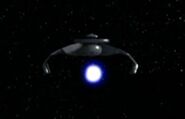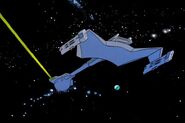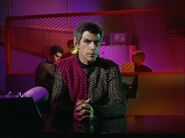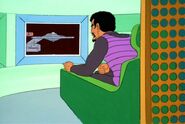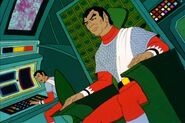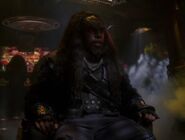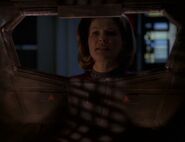m (→Studio model: corr.) |
(→Studio model: finetuning) |
||
| Line 160: | Line 160: | ||
The D7 class [[studio model]] was originally designed by [[Matt Jefferies]] who needed about two months from start to final design sketch. Its design was explored in the ''[[Star Trek: The Original Series Sketchbook]]'' where it was explained that in Jeffries' attempt to create the D7, he "''had to design a ship that would be instantly recognizable as an enemy ship, especially for a flash cut. There had to be no way it could be mistaken for our guys. It had to look threatening, even vicious.''" Taking an aerodynamic approach to his design, he ultimately "''modeled it on a {{w|manta ray}}, both shape and color, and that's why it looks as it does in the original series.''" |
The D7 class [[studio model]] was originally designed by [[Matt Jefferies]] who needed about two months from start to final design sketch. Its design was explored in the ''[[Star Trek: The Original Series Sketchbook]]'' where it was explained that in Jeffries' attempt to create the D7, he "''had to design a ship that would be instantly recognizable as an enemy ship, especially for a flash cut. There had to be no way it could be mistaken for our guys. It had to look threatening, even vicious.''" Taking an aerodynamic approach to his design, he ultimately "''modeled it on a {{w|manta ray}}, both shape and color, and that's why it looks as it does in the original series.''" |
||
| − | Ironically, the model was not commissioned by the producers for the show who had to contend with severe budget cuts during the third season, but resulted firstly from the wish of kit producer [[American Model Toy Corporation|Aluminum Model Toys]] (AMT) to do a follow-up of their highly successful ''Enterprise'' [[Star Trek model kits|model kit]]. Under their exclusivity agreement they manufactured a master model for shooting purposes as they had done with the ''[[Galileo (2267)|Galileo]]'' studio model. The ship's design was perfected by the twenty-fourth sketch on {{d|20|November|1967}}. The sketch was then sent to [[AMT |
+ | Ironically, the model was not commissioned by the producers for the show who had to contend with severe budget cuts during the third season, but resulted firstly from the wish of kit producer [[American Model Toy Corporation|Aluminum Model Toys]] (AMT) to do a follow-up of their highly successful ''Enterprise'' [[Star Trek model kits|model kit]], as Jefferies himself revealed in [[Star Trek: The Magazine Volume 2, Issue 9]]. Under their exclusivity agreement they manufactured a master model for shooting purposes as they had done with the ''[[Galileo (2267)|Galileo]]'' studio model. The ship's design was perfected by the twenty-fourth sketch on {{d|20|November|1967}}. The sketch was then sent to [[AMT]], and under personal supervision of Jefferies, Gene Winfield's "[[Custom & Speed Shop]]" produced two 3-feet long "master tooling models" of which one was turned over to the [[Howard Anderson Company]] for final detailing and filming stock footage to be used in the show. In order to make maximum use of their new nifty model and as a courtesy to AMT (who after all paid for the model) in order to get them the most exposure for their new model kit (S952), the producers decided to use it wherever possible in the remainder of the third season of TOS and so the new model first appeared on the air as a Romulan battle cruiser in "The Enterprise Incident" although it was first shot as a Klingon battle cruiser for "Elaan of Troyius" (which aired later). Its origin as a master tooling model for a model kit, as opposed to being a filming model was evident in the fact that the model had no internal lighting. The original model for the D7 was given (hand delivered by [[Dorothy Fontana]]) on {{d|7|November|1973}} to the {{w|Smithsonian Institution|Smithsonian}} {{w|National Air and Space Museum}} along with the tiny "Catspaw" model of the USS ''Enterprise''. "''I was trying to figure out how to pack it up to ship it. Dorothy Fontana was headed back to D.C. and agreed to take it for me; we put it in a plastic garbage back, which was not deep enough to to take the whole thing, so the head of it stuck out. Somebody on the airliner recognized it, so they unwrapped it and it toured the airliner!''", Jefferies recalled.(''Star Trek: The Magazine Volume 2, Issue 9'', pages 69-70 and ''[[Star Trek Giant Poster Book]], Issue 10'', 1977) |
{| style="float:right;" |
{| style="float:right;" |
||
|<gallery> |
|<gallery> |
||
| Line 175: | Line 175: | ||
The second "master tooling model" was handed over to the studio a short time later when AMT was done with it. It received the same finishing touch as the first model and was apart from slight detailing differences on the the warp engines assembly indistinguishable from the first one (exactly 2 times the size of the AMT model kit). Although slated to be also used for filming it was never used as such and ended up in Roddenberry's office for awhile. Roddenberry gave the model away to [[Stephen Edward Poe]] in recognition of his help in establishing the co-operation between the [[Desilu]] studios and ''AMT'' (in whose employ he was at the time). It changed hands several times before finally auctioned off in a [[Star Trek auctions | Profiles in History]]-auction in March 2006 for $65,000. [http://atomiccity.yuku.com/topic/528] [http://www.ketzer.com/PIH_Auction24.html] That model was acquired by Microsoft's co-founder {{w|Paul Allen}} for his {{w|Science Fiction Museum and Hall of Fame}} in Seattle, where it currently resides. |
The second "master tooling model" was handed over to the studio a short time later when AMT was done with it. It received the same finishing touch as the first model and was apart from slight detailing differences on the the warp engines assembly indistinguishable from the first one (exactly 2 times the size of the AMT model kit). Although slated to be also used for filming it was never used as such and ended up in Roddenberry's office for awhile. Roddenberry gave the model away to [[Stephen Edward Poe]] in recognition of his help in establishing the co-operation between the [[Desilu]] studios and ''AMT'' (in whose employ he was at the time). It changed hands several times before finally auctioned off in a [[Star Trek auctions | Profiles in History]]-auction in March 2006 for $65,000. [http://atomiccity.yuku.com/topic/528] [http://www.ketzer.com/PIH_Auction24.html] That model was acquired by Microsoft's co-founder {{w|Paul Allen}} for his {{w|Science Fiction Museum and Hall of Fame}} in Seattle, where it currently resides. |
||
[[File:IKS Gr'oth.jpg|thumb|left|[[Gregory Jein|Jein]]'s {{IKS|Gr'oth}} model in action]] |
[[File:IKS Gr'oth.jpg|thumb|left|[[Gregory Jein|Jein]]'s {{IKS|Gr'oth}} model in action]] |
||
| − | In {{y|1996}}, a new model of the D7-class, IKS ''Gr'oth'', was created by [[Greg Jein]] for DS9's "Trials and Tribble-ations." While referenced, but not seen, in the original version of the "Trouble with Tribbles," the model featured an amalgam of detail from both the ''Original Series'' model and the ''K't'inga''-class seen in {{film|1}}. The newer model bore a pale green coloration, in line with future Klingon vessels. Jein, a passionate life long fan of the original series, owned a set of molds of the original D7 studio model, made for ''Star Trek: Phase II'' (he acquired them after castings were made), and from those cast a model, which was further embellished.[http://drexfiles.wordpress.com/2010/05/23/propworx-trek-auction-unveiled/comment-page-1/#comment-25610] Apart from the additional slight hull detailing, reminiscent of the ''Phase II'' model, this model also sported internal lighting, strobe lights and lights on the crown of the bridge. Although the producers originally did not want to have the model built, because of budget concerns, effects supervisor for the episode [[Gary Hutzel]] pushed the construction through, after he discussed the matter with Jein,"''We talked for about fifteen seconds, and then Greg said "Oh, I'll build a shell. You paint it and detail it and we'll put it in the show.".''". (''[[The Magic of Tribbles: The Making of Trials and Tribble-ations]]'', page 45) Jein's passion for the project however, resulted in a fullblown studio model, produced at a bargain. |
+ | In {{y|1996}}, a new model of the D7-class, IKS ''Gr'oth'', was created by [[Greg Jein]] for DS9's "Trials and Tribble-ations." While referenced, but not seen, in the original version of the "Trouble with Tribbles," the model featured an amalgam of detail from both the ''Original Series'' model and the ''K't'inga''-class seen in {{film|1}}. The newer model bore a pale green coloration, in line with future Klingon vessels. Jein, a passionate life long fan of the original series, owned a set of molds of the original D7 studio model, made for ''Star Trek: Phase II'' (he acquired them after castings were made), and from those cast a model, which was further embellished.[http://drexfiles.wordpress.com/2010/05/23/propworx-trek-auction-unveiled/comment-page-1/#comment-25610] Apart from the additional slight hull detailing, reminiscent of the ''Phase II'' model, this model also sported internal lighting, strobe lights and lights on the crown of the bridge. Although the producers originally did not want to have the model built, because of budget concerns, effects supervisor for the episode [[Gary Hutzel]] pushed the construction through, after he discussed the matter with Jein,"''We talked for about fifteen seconds, and then Greg said "Oh, I'll build a shell. You paint it and detail it and we'll put it in the show.".''". (''[[The Magic of Tribbles: The Making of Trials and Tribble-ations]]'', page 45) Jein's passion for the project however, resulted in a fullblown studio model, produced at a bargain. |
| + | |||
| + | The molds Jein owned were put to good use besides the IKS ''Gr'oth'', apart from this ship he cast from the molds a ''D7''-class vessel that was featured in [[The Art of Star Trek]], page 19 (the model was later given to [[Doug Drexler]], who auctioned it off as [http://archive.propworx.com/1008/13 Lot#13] in the August 8th, 2010 [[Propworx']] [[Star Trek Prop and Costume Auction]], estimated at US$2,000-$3,000, where it sold for US$12,000}, and two ''K't'inga''-class vessels; the [[Unnamed K't'inga class starships#Qualor II hulk|unnamed ''K't'inga''-class]] in {{TNG|Unification I}} and the {{IKS|B'Moth}} in {{e|Soldiers of the Empire}}. |
||
| + | |||
Yet another model of the ''Gr'oth'', this time built entirely digitally, by [[CBS Digital]] and supervised by [[Dave Rossi]] and [[Niel Wray]], was created for the {{y|2006}} "remastered" version of numerous TOS episodes listed above. In regards to this model, during those appearances, [[Michael Okuda]] noted that "''the Klingon ship was basically in two forms. In early episodes, when it was very small on the screen, it was the original version of the ship, which had essentially no surface detail. In "The Enterprise Incident," "Elaan of Troyius," and "Day of the Dove," the ship was reworked somewhat to add surface texture. And, of course, in "The Enterprise Incident" we added the Romulan bird markings.''" [http://www.ottens.co.uk/forgottentrek/tmp_3.php] |
Yet another model of the ''Gr'oth'', this time built entirely digitally, by [[CBS Digital]] and supervised by [[Dave Rossi]] and [[Niel Wray]], was created for the {{y|2006}} "remastered" version of numerous TOS episodes listed above. In regards to this model, during those appearances, [[Michael Okuda]] noted that "''the Klingon ship was basically in two forms. In early episodes, when it was very small on the screen, it was the original version of the ship, which had essentially no surface detail. In "The Enterprise Incident," "Elaan of Troyius," and "Day of the Dove," the ship was reworked somewhat to add surface texture. And, of course, in "The Enterprise Incident" we added the Romulan bird markings.''" [http://www.ottens.co.uk/forgottentrek/tmp_3.php] |
||
Revision as of 00:36, 21 October 2010
The D7 class battle cruiser was a 23rd century warship originally designed and used by the Klingons, before being shared with the Romulans during the late-2260s.
History
The D7 class Klingon battle cruiser served as the backbone of the Klingon Imperial Fleet for several years during the 23rd century. (TOS: "Errand of Mercy" remastered, etc.) Among the mission profiles designated for this class was that of scout ship. (TOS: "Friday's Child", "A Private Little War" remastered)
By 2267, they were prominently featured in the Klingon-Federation Cold War, where they posed a serious threat to the security of Starfleet and the Federation. (TOS: "Elaan of Troyius"; TAS: "More Tribbles, More Troubles")
The Romulan Star Empire later began using the same the design by 2268. (TOS: "The Enterprise Incident")
The Template:ShipClass battle cruiser began to replace the D7 class during the 2270s. The D7 was finally "retired decades" prior to 2377. (Star Trek: The Motion Picture; VOY: "Prophecy")
Interest in these vessels by the Federation continued to appear well into the 2370s, as data on this class was commonly found within numerous Starfleet files. (TNG: "The Naked Now", "The Last Outpost", "Conspiracy"; VOY: "Drone", "The Voyager Conspiracy")
Technical data
Physical arrangement
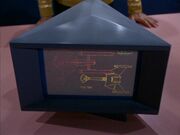
Overview comparison with a Template:ShipClass starship
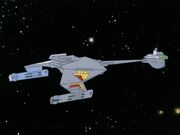
Romulan D7 profile
The D7 class was almost predatory in its appearance, with a spread-wing primary hull, long neck and head-like command pod. The early Romulan variants had a large bird-of-prey design painted on the hull, identical to what was found on the Bird-of-Prey. (TOS: "The Enterprise Incident") Other Romulan D7s had red and yellow feather-like detailing painted on the upper wing and nacelle pylon. (TAS: "The Survivor", "The Practical Joker")
The bulk of the ships overall mass was incorporated in the aft section of the ship. The bridge was located on the bulbous head, which was separated from the aft section by a relatively thin neck that flared out into the wings. Jutting from below these wings were a pair of outboard warp nacelles. The ship's impulse engines were located on the caudal section of the ship. (TOS: "Elaan of Troyius")
This design had evolved from a classic design lineage dating back well into the 22nd century with the early D5 class battle cruisers. (ENT: "Judgment") In terms of dimensions, it was comparable in size to the Federation's Template:ShipClass starship. (TOS: "The Enterprise Incident")
Tactical systems
During the mid-23rd century, the D7 class posed a significant threat to the Federation with the classes impressive armament consisting of dual wing-mounted disruptor cannons, a forward-mounted phaser emitter, and a forward launcher capable of firing photon torpedoes as well as magnetic pulses, and a strong disruptor emitter on Kohlar's battle cruiser. (VOY: "Prophecy"; TOS: "Errand of Mercy"; TAS: "More Tribbles, More Troubles")
While the D7 cruiser was often viewed as a threat to a Constitution-starship, under certain circumstances, it was possible for a Constitution to destroy a single D7 with a barrage of phaser fire. Following such an instance at the outbreak of the Federation-Klingon War in 2267, the USS Enterprise encountered a fleet of eight D7s, which was considered by Captain James T. Kirk to have superior odds. Despite these odds, Hikaru Sulu was confident the Enterprise could have defeated them. (TOS: "Errand of Mercy" remastered)
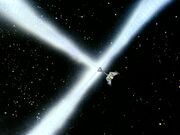
Firing a projected stasis field
In 2269, the Klingons developed a prototype weapon, described as a projected stasis field, which was first encountered on the IKS Gr'oth by the Federation. The field could be projected in up to three different directions at one time. The weapon, which was extremely powerful, was capable of completely paralyzing an enemy vessel, including all its vital systems. It was however equally crippling to the firing ship itself. Ultimately, it was determined by the Federation that this was so impractical in standard combat, that it posed no real threat. (TAS: "More Tribbles, More Troubles")
By the late 24th century, these vessels were considered rather antiquated, and were identified as being inferior in firepower to a Federation Template:ShipClass starship. (VOY: "Prophecy")
Cloaking device
Like its predecessor, the Romulan Bird-of-Prey, the Romulan D7 was equipped with cloaking technology.
Klingon ships were outfitted with cloaking devices as late as 2269. One of the first Klingon vessels to acquire the new technology was the IKS Klothos. (TAS: "The Time Trap"; DS9: "Once More Unto the Breach")
Propulsion systems

Engine room, with a giant tribble colony
Some Klingon ships in the 23rd century were equipped with an S-2 graf unit, which was roughly equivalent to the warp drives in the Federation's Template:ShipClass starships. The warp drive of the D7 enables it to reach the speed of warp 9. (TAS: "The Time Trap"; TOS: "Elaan of Troyius", "The Enterprise Incident")
In addition, D7s impulse drive consisted of four-port engines, presumably giving the ship enhanced maneuverability at sublight speeds. (TOS: "Elaan of Troyius" remastered)
Other systems
Romulan D7s were outfitted with food synthesizers. (TAS: "The Practical Joker")
Interior design
Crew complement
The average crew complement of a Klingon D7 was comparable to a Constitution-class, and consisted of around 430. (TOS: "Day of the Dove")
Main bridge
Referred to by the Romulans as "Control Central", the bridge was the nerve center of the D7 class. (TOS: "The Enterprise Incident")
Conference room
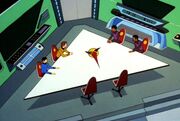
Conference room of the D7 class Klothos
The conference room was used as a meeting place for the ship's senior staff for mission briefings. It contained a triangular table embossed with the emblem of the Klingon Empire, with each side of the table having its own set of chairs. Surrounding the table are various computer consoles. (TAS: "The Time Trap")
Ships commissioned
- Named
- Unnamed
Appendices
Appearances
- TOS:
- "Errand of Mercy" (2007 remastered version)
- "Friday's Child" (2006 remastered version)
- "The Trouble with Tribbles" (2006 remastered version)
- "A Private Little War" (2008 remastered version)
- "Elaan of Troyius"
- "The Enterprise Incident"
- "Day of the Dove"
- TAS:
- TNG:
- "The Naked Now" (LCARS graphic)
- "The Last Outpost" (LCARS graphic)
- "Conspiracy" (LCARS graphic)
- DS9:
- "Trials and Tribble-ations"
- "Favor the Bold" (LCARS graphic)
- "Sacrifice of Angels" (LCARS graphic)
- "Tears of the Prophets" (LCARS graphic)
- "What You Leave Behind" (LCARS graphic)
- VOY:
- "Drone" (LCARS graphic)
- "The Voyager Conspiracy" (LCARS graphic)
- "Prophecy"
Background
Name origins
The term "D7" remained the speculated designation for the Klingon battle cruiser for many years, with origins rooting to an incident Gene Roddenberry recalls in The Making of Star Trek, which is linked to how he likened the cast's relationship to that of a family:
I went to the stage one day, and they were all ready and waiting for me, because they knew I was really exhausted from some long rewrite sessions. As soon as I walked up to the set, Bill and Leonard blew a scene, but they blew it on purpose and began arguing very violently. Bill was shouting at the top of his voice, "Leonard! What do you mean saying this is a D-7 Klingon ship! It's a D-6!" Leonard shouted back, "No, you idiot, the D-6 has four doors over here and the D-7 only has two!" Bill immediately shouted back, "No, no, no – it's the other way around. You've got it all wrong."
While all of this is going on, I'm standing there, beginning to get frustrated, watching the minutes tick by and mentally counting the money we're losing in expensive crew time, because the cameras aren't rolling. And as the argument continued, I'm thinking to myself, "What are they talking about? They've gone too far!" Then I remembered thinking that I should remember which is the D-6 or the D-7. Finally I couldn't stand it any more, and so I walked in between them and said, "Come on, fellows, it really doesn't matter. Let's get on with the scene." Then the whole crew broke up laughing. This was their way of saying to me, "Hey, time is not that serious. Relax a little."
The designation was not actually referenced on screen until Star Trek's 30th anniversary, in the DS9 Season 5 episode "Trials and Tribble-ations", and later in the VOY Season 7 episode "Prophecy".
Studio model
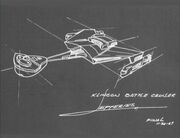
Final design sketch
The D7 class studio model was originally designed by Matt Jefferies who needed about two months from start to final design sketch. Its design was explored in the Star Trek: The Original Series Sketchbook where it was explained that in Jeffries' attempt to create the D7, he "had to design a ship that would be instantly recognizable as an enemy ship, especially for a flash cut. There had to be no way it could be mistaken for our guys. It had to look threatening, even vicious." Taking an aerodynamic approach to his design, he ultimately "modeled it on a manta ray, both shape and color, and that's why it looks as it does in the original series."
Ironically, the model was not commissioned by the producers for the show who had to contend with severe budget cuts during the third season, but resulted firstly from the wish of kit producer Aluminum Model Toys (AMT) to do a follow-up of their highly successful Enterprise model kit, as Jefferies himself revealed in Star Trek: The Magazine Volume 2, Issue 9. Under their exclusivity agreement they manufactured a master model for shooting purposes as they had done with the Galileo studio model. The ship's design was perfected by the twenty-fourth sketch on 20 November 1967. The sketch was then sent to AMT, and under personal supervision of Jefferies, Gene Winfield's "Custom & Speed Shop" produced two 3-feet long "master tooling models" of which one was turned over to the Howard Anderson Company for final detailing and filming stock footage to be used in the show. In order to make maximum use of their new nifty model and as a courtesy to AMT (who after all paid for the model) in order to get them the most exposure for their new model kit (S952), the producers decided to use it wherever possible in the remainder of the third season of TOS and so the new model first appeared on the air as a Romulan battle cruiser in "The Enterprise Incident" although it was first shot as a Klingon battle cruiser for "Elaan of Troyius" (which aired later). Its origin as a master tooling model for a model kit, as opposed to being a filming model was evident in the fact that the model had no internal lighting. The original model for the D7 was given (hand delivered by Dorothy Fontana) on 7 November 1973 to the Smithsonian National Air and Space Museum along with the tiny "Catspaw" model of the USS Enterprise. "I was trying to figure out how to pack it up to ship it. Dorothy Fontana was headed back to D.C. and agreed to take it for me; we put it in a plastic garbage back, which was not deep enough to to take the whole thing, so the head of it stuck out. Somebody on the airliner recognized it, so they unwrapped it and it toured the airliner!", Jefferies recalled.(Star Trek: The Magazine Volume 2, Issue 9, pages 69-70 and Star Trek Giant Poster Book, Issue 10, 1977)
Template:ShipClass test shot for Star Trek: Phase II |
The original studio model was originally finished by the Howard Anderson Company in a multi-colored paint scheme (light green and gray), applied personally by Jefferies (He also applied the klingon emblem and the Klingon lettering, the first time ever they appeared in Star Trek. Both were also designed by Jefferies). But that scheme was obscured by studio lighting conditions in combination with blue-screen filming, resulting in what appeared to be a blue-gray overall color on screen, an effect known as "blue spill". This impression was reinforced by the box art of the release of the D7 kit by AMT (No. S952). Interestingly, in the Animated Series episode "More Tribbles, More Troubles", Koloth's battle cruiser, IKS Gr'oth adheres to the original paint scheme, though the two colors are reversed. Neither this model nor the second model, being constructed out of solid wood, were outfitted with an internal lighting system.
In 1977 the model was returned to Paramount Pictures for intended use in the Star Trek: Phase II television project where it received a new paint job (gray, dark green and metal blue). However it was quickly decided that the model would not stand up to the requirements television standards of the late 70's demanded and especially not to the big screen requirements when Phase II was upgraded to a major movie project. By then the decision had been made to have Magicam, supervised by Jim Dow, built a new, more detailed twice as large (6ft) scale model of the D7, (reminiscent of the model Greg Jein later built for Star Trek: Deep Space Nine) based on molds taken from the by now disassembled original television model. Construction on this model [1], this one outfitted with an internal lighting system and subsequent test shooting [2] were in progress and signed off on when "Magicam" delivered the model to the producers in July 1978. However, further refinement for movie purposes by that time was deemed necessary, which was done by John Dykstra's Apogee, Inc. model shop, resulting this model eventually becoming the Template:ShipClass. "We had to modify it pretty severely though, because apparently it was not designed to be shot in the same kind of circumstances that we ended up shooting it in. I don't know what Bob Abel planned to do with it, but for us, the practical lighting on the model was so dim that we weren't able to get a good exposure off it even by pushing the film a couple stops and using a twenty-second exposure", Dykstra elaborated.(Cinefex, No.2, page 52)
With no further use for the original television studio model, it was in its disassembled state send back to the Smithsonian and kept in storage. It was still in its new paint scheme, when Ed Miarecki undertook a major renovation on the model in 1991 in preparation for the Star Trek Smithsonian Exhibit and in 1993 the D7 model and the K'tinga model were reunited for a short time when the K'tinga was on loan to the Smithonian. [3] Miarecki, apparently unaware of the original paint scheme at the time, repainted the model in the blue-gray mono colored scheme as was normally perceived by television audiences. [4]
The second "master tooling model" was handed over to the studio a short time later when AMT was done with it. It received the same finishing touch as the first model and was apart from slight detailing differences on the the warp engines assembly indistinguishable from the first one (exactly 2 times the size of the AMT model kit). Although slated to be also used for filming it was never used as such and ended up in Roddenberry's office for awhile. Roddenberry gave the model away to Stephen Edward Poe in recognition of his help in establishing the co-operation between the Desilu studios and AMT (in whose employ he was at the time). It changed hands several times before finally auctioned off in a Profiles in History-auction in March 2006 for $65,000. [5] [6] That model was acquired by Microsoft's co-founder Paul Allen for his Science Fiction Museum and Hall of Fame in Seattle, where it currently resides.

Jein's IKS Gr'oth model in action
In 1996, a new model of the D7-class, IKS Gr'oth, was created by Greg Jein for DS9's "Trials and Tribble-ations." While referenced, but not seen, in the original version of the "Trouble with Tribbles," the model featured an amalgam of detail from both the Original Series model and the K't'inga-class seen in Star Trek: The Motion Picture. The newer model bore a pale green coloration, in line with future Klingon vessels. Jein, a passionate life long fan of the original series, owned a set of molds of the original D7 studio model, made for Star Trek: Phase II (he acquired them after castings were made), and from those cast a model, which was further embellished.[7] Apart from the additional slight hull detailing, reminiscent of the Phase II model, this model also sported internal lighting, strobe lights and lights on the crown of the bridge. Although the producers originally did not want to have the model built, because of budget concerns, effects supervisor for the episode Gary Hutzel pushed the construction through, after he discussed the matter with Jein,"We talked for about fifteen seconds, and then Greg said "Oh, I'll build a shell. You paint it and detail it and we'll put it in the show.".". (The Magic of Tribbles: The Making of Trials and Tribble-ations, page 45) Jein's passion for the project however, resulted in a fullblown studio model, produced at a bargain.
The molds Jein owned were put to good use besides the IKS Gr'oth, apart from this ship he cast from the molds a D7-class vessel that was featured in The Art of Star Trek, page 19 (the model was later given to Doug Drexler, who auctioned it off as Lot#13 in the August 8th, 2010 Propworx' Star Trek Prop and Costume Auction, estimated at US$2,000-$3,000, where it sold for US$12,000}, and two K't'inga-class vessels; the unnamed K't'inga-class in TNG: "Unification I" and the IKS B'Moth in "Soldiers of the Empire".
Yet another model of the Gr'oth, this time built entirely digitally, by CBS Digital and supervised by Dave Rossi and Niel Wray, was created for the 2006 "remastered" version of numerous TOS episodes listed above. In regards to this model, during those appearances, Michael Okuda noted that "the Klingon ship was basically in two forms. In early episodes, when it was very small on the screen, it was the original version of the ship, which had essentially no surface detail. In "The Enterprise Incident," "Elaan of Troyius," and "Day of the Dove," the ship was reworked somewhat to add surface texture. And, of course, in "The Enterprise Incident" we added the Romulan bird markings." [8]
Inconsistencies
- In writing the DS9 Season 7 episode, "Once More Unto the Breach", Ronald D. Moore stated that he intentionally included a nod to The Animated Series by means of a reference to the TAS Season 1 episode "The Time Trap". [9]
- In this reference, the elderly Kor recalled the time when he commanded the Klothos during the Battle of Caleb IV, a vessel he described as being "one of the old D-5 cruisers." While the reference the cloaking device-equipped Klothos matched the Klothos that appeared in "The Time Trap", the design itself had actually appeared as a slight variant of the D7 class, rather than the D5 class design that was later introduced in the ENT Season 2 episode ENT: "Marauders".
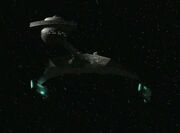
The D7 from "Prophecy"
- The designation of the Klingon battle cruiser that appear in the episode "Prophecy" was misidentified in the script during the ship's appearance. Writer Mike Sussman later explained the mistake in a response to an article. [10] He assumed that the physical model built by Jein from "Trials and Tribble-ations" could be reused in the episode. However all the effects were apparently to be computer generated. To his knowledge, a CGI version of Jein's D7 did not exist at the time and it would have cost a fair amount of money to design one. Had Sussman been aware of this, he would have simply changed the script. As a result, this usage may be interpreted as a transitional predecessor to the K't'inga in the D7 lineage.
External links
- Template:Exastris
- Klingon/Romulan Battle Cruiser at Curt Danhauser's Guide to Animated Star Trek
- Template:NCwiki


